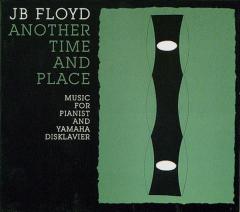JB FLOYD / Another Time and Place
JB Floyd, Liana Pailodze (Yamaha Disklavier)
This compilation of JB Floyd's Keyboard Music with the aid of the Yamaha Disklavier, spanning over 30 years of his career, signifies the great breadth of his creative experience and his surprising individuality in such diverse disciplines of musical style.
"TRIBUTE For my Father"(1991) is a live performance by the composer. "SOLOS AND SEQUENCES I"(1999) is a composition for pianist and Yamaha Disklavier performed here by Liana Pailodze. "VARIATIONS-1979" was the first composition to capture the kind of music that Floyd has been improvising all his life. "WAVES: THE EBB AND FLOW"(1981) is related to the sounds of the Atlantic Ocean and its powerful, incessant wave motion. "SOLOS AND SEQUENCES II, for pianist and Yamaha Disklavier, performed by Liana Pailodze. The unique sounds of the Buchla Synthesizer inspires "PRINCE OF PENTACLES"(1979) by transforming the piano to enable it to realize many more possibilities of timbre. "ANOTHER TIME AND PLACE (1993), for Yamaha Disklavier, virtual instruments, percussion and solo pianist, performed by Doug Floyd and JB Floyd.
TRACK LIST
Tribute (10:02)
Solos and Sequences I (8:38)
Variations: 1979 (10:56)
Waves: The Ebb and Flow (619)
Solos and Sequences II (6:19)
Prince of Pentacles (9:51)
Another Time and Place (10:01)
REVIEWS
Ed Pinsent (Uncertain Ground), The Sound Projector
At some stage in the 1990s I think the Synclavier technology developed in even more powerful ways, integrating a hard disk system with a piano keyboard to create a smaller and more portable instrument that could also enable a larger range of sounds and samples to be performed, simply by inserting diskettes into a slot. I also imagine this probably caused heart failure among certain sectors of the Musicians Union at the same time. This is what I assume we are hearing on JB Floyd‘s Another Time and Place (MUTABLE MUSIC MUTABLE 17546-2), which is subtitled “Music for Pianist and Yamaha Disklavier”. The album showcases a number of Floyd’s compositions, some dating back to 1979. In fact it’s the 1979 piece ‘Variations’ which might be a good place to start for the uninitiated, as it’s suitably approachable with some sweet chords, rhythmic flow, and a jazzy feel to the melodic top line, all of which sweetens the listener in preparation for the more “difficult” pieces of the 1990s. ‘Solos and Sequences I’ for example abandons a steady rhythm in favour of a choppy and unpredictable metre, the chord structures are taken apart and reassembled like schematic diagrams, and any melodic content is much harder to pick out from the complex array of notes. Even so, here we can still discern what Floyd counts as his earliest musical influence – the boogie woogie piano music of Albert Ammons and Pete Johnson, two examples of titanic Afro-American players whose complex music outgrew both the blues and jazz idioms, in my view. Floyd’s trills, decorations and arpeggios may not have the same directness as Ammons, and his music may be more atonal in places, but he emulates those players almost exactly in his understanding of how to use the full range of the keyboard’s scale to great advantage. Dramatic and bold use of low and high notes, in other words. There’s also ‘Waves: The Ebb and Flow’ which is an explicit attempt to imitate the motion of the Atlantic ocean with note-clusters and chordal shapes that Debussy woulda loved; and the intriguing ‘Prince of Pentacles’ where he transforms the piano using the Buchla synth system, achieving some very subtle and mysterious tones without really calling attention to the electronic component deployed. This restrained, Tarot-card inspired composition is a real grower, and really brings home how much this album is a very American manifestation of modern classical chamber music, open to the possibilities of prepared piano and synthesis.
Julian Cowley WIRE MAGAZINE February, 2012
Keyboard player and composer JB Floyd grew up in East Texas listening enthusiastically to boogie-woogie. In 1972 he appeared at London's Roundhouse during the ICES Festival, performing with the multimedia outfit Electric Stereopticon and in a high-energy piano duo with fellow composer David Rosenboom. Given that vintage, Floyd's recorded output has been extremely slim. Recently Mutable Music have been rectifying such neglect, retrieving Floyd and Rosenboom's tremendous Suitable for Framing, and this is the third CD of his later music. Prince of Pentacles (1979) uses Buchla synthesizer to expand the piano's timbre range. An inquisitive musician, clearly familiar with a broad spectrum of jazz history and the classical repertoire, Floyd responds t digital options yet remains vigorously committed to the grand piano's core sound.

